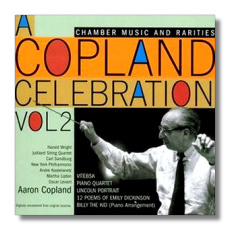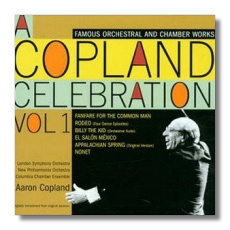
The Internet's Premier Classical Music Source
Related Links
- Copland Reviews
- Latest Reviews
- More Reviews
-
By Composer
-
Collections
DVD & Blu-ray
Books
Concert Reviews
Articles/Interviews
Software
Audio
Search Amazon
Recommended Links
Site News
 CD Review
CD Review
Aaron Copland

A Copland Celebration, Volume 2
Chamber Music & Rarities
- Vitebsk, Study on a Jewish Theme for Piano Trio 1
- Sextet 2
- Piano Quartet 3
- Duo for flute and piano 4
- Lincoln Portrait 5
- 12 Poems of Emily Dickinson 6
- Old American Songs 7
- Billy the Kid (excerpts, arr. Lukas Foss) 8
1-4, 6,7 Aaron Copland, piano
8 Oscar Levant, piano
2 Harold Wright, clarinet
4 Elaine Shaffer, flute
6 Martha Lipton, mezzo-soprano
7 William Warfield, baritone
5 Carl Sandburg, narrator
1-3 Juilliard String Quartet
5 New York Philharmonic Orchestra/André Kostelanetz
Sony SM2K89326 61:41 + 75:00
Summary for the Busy Executive: Something to celebrate.
Released by Sony as Volume 2 of "A Copland Celebration," the CD features works that never did all that well as LPs. Damned if I know why. Sony's done a wonderful job of going into the vaults and lugging out bullion, wonderful works in wonderful performances, quite a few of them featuring the composer as pianist. Copland, by every account I've read, could have been a virtuoso, had he so chosen. He lacked only a finished tone. On the other hand, he wrote somewhere that he preferred a rougher sound in his own music, perhaps associating the pearly touch with facile insincerity.
Excepting piano works, less than half of Copland's chamber music (and there aren't all that many pieces to begin with) began or ended up as chamber music. Vitebsk, the Piano Quartet, and the Duo represent a majority of original chamber pieces that stayed that way. Also, compared to composers like Barber and Diamond, Copland published very few songs (and almost no a cappella work). Nevertheless, he managed to produce some of the greatest American works in these genres.
Inspired by The Dybbuk written by Saul Ansky, Vitebsk for piano trio is the most aggressively modern piece on the program, and also the most dated. It definitely smacks of its time – the Twenties and early Thirties – both in its somewhat expressionist inspiration and in its use of dissonance. This is also the only Copland piece I know that has any connection with Jewish culture. Curiously enough, however, despite its subtitle of "Study on a Jewish Theme," I find almost no attempt to evoke the music of that culture. It sounds instead very much like parts of the Statements for Orchestra and of the Piano Variations. Copland's Jewish roots became sublimated in his "big-city" music, those passages and pieces that Bernstein described as the Old Testament prophet laying down the law, and one gets a good dose of this in the "French overture" opening to Vitebsk.
[ Also available - Volume 1 on Sony SM2K89323
Amazon
- UK
- Germany
- Canada
- France
- Japan
- ArkivMusic
- CD Universe
]
The Sextet re-arranges Copland's Short Symphony, my favorite and the most obviously Stravinskian of his symphonies. The designation "short" reflects its duration, but not its substance. This is one of the most elegant works I know, where every note does heavy lifting. In three lean movements, it has always struck me as an American take on the type of sprightly Stravinsky neoclassicism represented by the "Dumbarton Oaks" Concerto, light and lively, with an American expansiveness of expression. Apparently, the nimble rhythms gave early orchestras fits, although they would hardly provoke comment today, so Copland, always practical rewrote the work for string quartet, clarinet, and piano. I don't know how he managed it, but he suggests much of the original orchestral color with these reduced forces. Indeed, I find it difficult to decide whether I prefer the symphony or the Sextet.
The Piano Quartet, like Vitebsk, is one of Copland's rare original chamber works. I consider it one of the monuments of American music. His first major piece written in dodecaphonic serialism, it definitely falls under the category of Hard. Why did he turn to serialism? Mainly, he felt stale. He had begun several major pieces in his Forties vein (including what should have become a Ballad for piano and orchestra) and left them unfinished. However, to those of you who, without hearing the work, already think you know what you're in for, I'll say you're wrong. This sounds like Copland, not like Babbitt or Schoenberg or any twelve-tone bête noir you may happen to think of. In the first movement alone occurs a gorgeous passage of pure consonance that could have come right out of Appalachian Spring. How he achieved this, I don't know. As in almost every Copland work, the narrative line runs clearly and compellingly. Howard Pollack's liner notes describe it as "dour," but I'd call it "powerful" instead. I can't recommend this work highly enough, especially to those listeners who think that a specific set of technical procedures guarantee or exclude beauty.
The Duo for flute (later rewritten for clarinet) and piano comes from the end of Copland's composing career, although he lived twenty more years. The work seems to look back over the composer's mature career. The first movement draws from the Appalachian spring, the second from his Thirties Modernism, and the third from the old spring again. Indeed, the opening idea of the last movement sounds startlingly like a conflation of the two major allegros from the ballet suite. It's a very pretty piece, but definitely Copland lite.
I've always had a problem with the musical genre of melodrama – the use of a speaker with music. Either the music is good enough to make the speaker superfluous, or the speaker reduces the music to lame, aimless accompaniment. That said, I consider Copland's Lincoln Portrait one of the best examples of its kind, perhaps because he keeps the speaker at bay for a while. Before that, we get a powerful meditation on the open prairie and brilliant, shiny shards of folk tunes and minstrel songs in a complex, though not murky, whirl. From this, the "Lincoln theme," similar to the main idea of Fanfare for the Common Man, emerges. Rather than deferring to the end, I'll say now that I consider Kostelanetz and Sandburg the best performers of this music on record. Kostelanetz premièred the work, all the way back in the Forties, and regularly programmed it. Bernstein's New York Philharmonic play for him better than they usually played for Bernstein, with glorious tone and no discernable fluffs.
The work's main problem comes from the text. Lincoln, in addition to his stature as perhaps the great American President, is also one of the great American prose writers – with a line as stripped of "ornament" as a Shaker cabinet, where each word is the right word and does its full amount of honest work and where the line of argument goes swiftly to the heart of the matter. If we had to deal only with Lincoln's words, we'd have less of a problem. However, we also get "connective tissue," apparently written by the composer, in the hokey, gassy, faux-Whitman style so popular during the Forties, which raises its pimply head even today in the efforts of adolescents striving for poetry. Copland recognized the limitations of this text and consequently favored a flat reading (he used Henry Fonda for his own recording). I think he took precisely the wrong approach. The flat reading tends to emphasize the beachball emptiness of the composer's text. Copland's words fail most tests for substance, but they are indeed a kind of music. You need, therefore, a reader who knows how to get the music. James Earl Jones and Gerard Schwarz do a fine job on Delos, but for me, few "sing" as well as Sandburg – a virtuoso, in fact, of artificiality. Although you would probably want to give his reading of, say, Shakespeare's sonnets a miss, he's pitch-perfect in the Portrait. Hokey and over-the-top sentimental in many other contexts, his artificiality here suits that of the text. Copland hated Sandburg's reading. He should have worked on his libretto instead.
Copland sang, mainly through the orchestra. As I've said, he has very few songs in his catalogue but, paradoxically, two major song cycles: 12 Poems of Emily Dickinson and the Old American Songs. For years, I've known the Dickinson songs only in Copland's stereo remake with Adele Addison and regarded them as well-made but uninvolving. The earlier, mono recording with Copland and mezzo Martha Lipton has been nothing short of revelatory. Lipton has a better-sounding instrument than Addison and declaims the poetry better. She and Copland create a mutually-sensitive partnership that catches the songs' mercurial shifts. Copland recorded the Old American Songs with Warfield twice – once mono, with piano; once stereo, with orchestra. Both performances are both outstanding and essential (you can get the orchestral version on Sony SM2K89329; last time I looked, you could pick up both that and the current volume from BMG Music Service – D238306 and D238305, respectively). Warfield, despite his vocal problems, always communicated like gangbusters. His singing pierced a listener's heart. He was that rare commodity, a great classical singer of English. The earlier performance here features Warfield in better, stronger, clearer voice than on the remake, and Copland supports him beautifully. Warfield gives you not only clear diction, but clear American colloquial diction, absolutely right for these songs. For example, in "Simple Gifts" (the tune that provides the variations theme of Appalachian Spring), Warfield gives the word "just" – "And when we find ourselves in the place just right" – the spin of leaving off the final t and a vowel occupying a perfect groove between "just" and "jest." This is finely-judged singing of the highest order. After many years, both recordings remain among my favorite recorded vocal performances.
We wind up with a bon-bon: excerpts from Billy the Kid arranged by Lukas Foss for solo piano. Oscar Levant plays. Levant has largely been forgotten as a pianist, his reputation overshadowed by his genius as a wit, memoirist, addict, and character actor. During his time, he was considered a great virtuoso, particularly in Romantic and post-Romantic repertoire, known for his Rubinstein and his Tchaikovsky. He tended to play Modern composers he knew personally: Gershwin, of course, Schoenberg (with whom he studied composition), and Copland. Those who remember his playing in his later years – sloppy and scattered – might be surprised by the sophistication, delicacy of touch, and overflowing musicality he shows here. This was a first-rate musical mind. Foss's arrangement is good, but not miraculous. That is, it doesn't convey the sound of the orchestra. Levant does a wonderful job, emphasizing the cleanness of Copland's musical thought.
All these performances, in fact, I consider the best you can get, all definitive. The sound, even the mono sound, is quite fine.
Copyright © 2004, Steve Schwartz




















